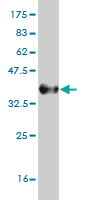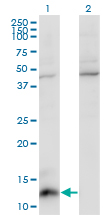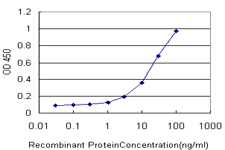CCL7 Antibody (monoclonal) (M03)
Mouse monoclonal antibody raised against a partial recombinant CCL7.
- SPECIFICATION
- CITATIONS
- PROTOCOLS
- BACKGROUND

Application
| WB, E |
|---|---|
| Primary Accession | P80098 |
| Other Accession | NM_006273 |
| Reactivity | Human |
| Host | mouse |
| Clonality | Monoclonal |
| Isotype | IgG2b Kappa |
| Clone Names | 4B5 |
| Calculated MW | 11200 Da |
| Gene ID | 6354 |
|---|---|
| Other Names | C-C motif chemokine 7, Monocyte chemoattractant protein 3, Monocyte chemotactic protein 3, MCP-3, NC28, Small-inducible cytokine A7, CCL7, MCP3, SCYA6, SCYA7 |
| Target/Specificity | CCL7 (NP_006264, 24 a.a. ~ 99 a.a) partial recombinant protein with GST tag. MW of the GST tag alone is 26 KDa. |
| Dilution | WB~~1:500~1000 E~~N/A |
| Format | Clear, colorless solution in phosphate buffered saline, pH 7.2 . |
| Storage | Store at -20°C or lower. Aliquot to avoid repeated freezing and thawing. |
| Precautions | CCL7 Antibody (monoclonal) (M03) is for research use only and not for use in diagnostic or therapeutic procedures. |

Thousands of laboratories across the world have published research that depended on the performance of antibodies from Abcepta to advance their research. Check out links to articles that cite our products in major peer-reviewed journals, organized by research category.
info@abcepta.com, and receive a free "I Love Antibodies" mug.
Provided below are standard protocols that you may find useful for product applications.
Background
This gene encodes monocyte chemotactic protein 3, a secreted chemokine which attracts macrophages during inflammation and metastasis. It is a member of the C-C subfamily of chemokines which are characterized by having two adjacent cysteine residues. The protein is an in vivo substrate of matrix metalloproteinase 2, an enzyme which degrades components of the extracellular matrix. This gene is part of a cluster of C-C chemokine family members on chromosome 17q.
References
Evaluation of candidate stromal epithelial cross-talk genes identifies association between risk of serous ovarian cancer and TERT, a cancer susceptibility hot-spot. Johnatty SE, et al. PLoS Genet, 2010 Jul 8. PMID 20628624.Fucosyltransferase 2 (FUT2) non-secretor status is associated with Crohn's disease. McGovern DP, et al. Hum Mol Genet, 2010 Sep 1. PMID 20570966.Interleukin-9 polymorphism in infants with respiratory syncytial virus infection: an opposite effect in boys and girls. Schuurhof A, et al. Pediatr Pulmonol, 2010 Jun. PMID 20503287.Polymorphisms in innate immunity genes and risk of childhood leukemia. Han S, et al. Hum Immunol, 2010 Jul. PMID 20438785.Risk of meningioma and common variation in genes related to innate immunity. Rajaraman P, et al. Cancer Epidemiol Biomarkers Prev, 2010 May. PMID 20406964.
If you have used an Abcepta product and would like to share how it has performed, please click on the "Submit Review" button and provide the requested information. Our staff will examine and post your review and contact you if needed.
If you have any additional inquiries please email technical services at tech@abcepta.com.













 Foundational characteristics of cancer include proliferation, angiogenesis, migration, evasion of apoptosis, and cellular immortality. Find key markers for these cellular processes and antibodies to detect them.
Foundational characteristics of cancer include proliferation, angiogenesis, migration, evasion of apoptosis, and cellular immortality. Find key markers for these cellular processes and antibodies to detect them. The SUMOplot™ Analysis Program predicts and scores sumoylation sites in your protein. SUMOylation is a post-translational modification involved in various cellular processes, such as nuclear-cytosolic transport, transcriptional regulation, apoptosis, protein stability, response to stress, and progression through the cell cycle.
The SUMOplot™ Analysis Program predicts and scores sumoylation sites in your protein. SUMOylation is a post-translational modification involved in various cellular processes, such as nuclear-cytosolic transport, transcriptional regulation, apoptosis, protein stability, response to stress, and progression through the cell cycle. The Autophagy Receptor Motif Plotter predicts and scores autophagy receptor binding sites in your protein. Identifying proteins connected to this pathway is critical to understanding the role of autophagy in physiological as well as pathological processes such as development, differentiation, neurodegenerative diseases, stress, infection, and cancer.
The Autophagy Receptor Motif Plotter predicts and scores autophagy receptor binding sites in your protein. Identifying proteins connected to this pathway is critical to understanding the role of autophagy in physiological as well as pathological processes such as development, differentiation, neurodegenerative diseases, stress, infection, and cancer.




